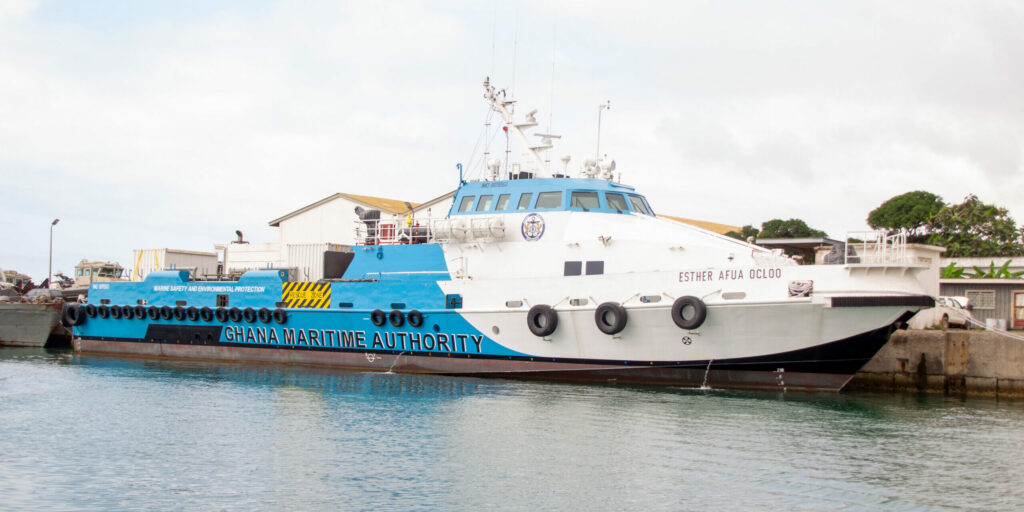Ghana Maritime Authority
New multi-purpose vessel Esther Afua Ocloo World Maritime Day
The Ghana Maritime Authority has increased its efforts at protecting the marine environment, especially from oil spills, with the acquisition of a new multi-purpose vessel.
Presidential ceremony
In mid-September mv Esther Afua Ocloo was commissioned at the Sekondi Naval Base by HE President Nana Addo Dankwa Akufo-Addo.
Christened Esther Afua Ocloo, after the Ghanaian industrialist who pioneered canned foods under the brand name Nkulenu, the vessel is fitted with an advanced oil spill recovery system made up of Desmi DBD 16 combination skimmer, HARBO oil spill boom, an oil spray dispersant system capable of handling Tier 1 and 2 spills in the harbour and offshore.
It has two aerial drones for wide area surveillance to identify activities and spills in the country’s waters.
Transport Minister, Mr Kwaku Ofori Asiamah, praised the Ghana Maritime Authority for the steps taken towards protecting Ghana’s marine environment from oil spills which have grave adverse effects on marine life.
He said the acquisition and unveiling of the oil spill response vessel Esther Afua Ocloo marked a significant milestone in the country’s maritime sector.
This, he said, was because it provided a vital platform to help the Authority carry out its mandate of creating a vibrant, safe and secured maritime ecosystem for economic growth and development.
Esther Afua Ocloo, built in Singapore by renowned ship builders, Penguin Shipyard Asia Pte Ltd., has an overall length of 40.00 metres, a moulded breadth of 7.60 metres, a moulded depth of 3.65 metres with a draught of 1.89 metres. It is fitted with three Cummins KTA36-m2 engines and three Caterpillar SR4 Alternator 86eKW generators.
Given the rapid expansion of ports and offshore activities in Ghana, it became imperative for the Ghana Maritime Authority to expand its oil spill response recovery strategy to meet the growing demand.
The Authority says it has a long-term plan to increase the number of vessels and amount of equipment, and to train and equip staff to respond to Tier 1 and 2 oil spills. At the same time it will be putting in place the necessary measures to detect spills within Ghana’s maritime jurisdiction, and engage stakeholders for the purposes of creating awareness and preparedness.
World Maritime Day
In common with the world-wide maritime community Ghana celebrated World Maritime Day on 28 September to recognize arguably the most important industry on which humanity depends.
To quote Thomas K Alonsi, Director-General, Ghana Maritime Authority, in advance of the day: ‘It is not being dramatic when we say that but for the maritime industry, half of the world would freeze to, and the remaining half would starve to, death. International shipping is responsible for the carriage of 90 percent of world trade and therefore constitutes the lifeblood of the global economy.
‘Indeed, the International Chamber of Shipping estimates that, yearly, “the shipping industry transports nearly two billion tons of crude oil, one billion tons of iron ore (the raw material needed to create steel), and 350 million tons of grain. These shipments would not be possible by road, rail or air.”
‘More importantly, these “raw materials allow countries to create industries, construct cities, house and move populations, and transform resources into refined products for re-export. This ability to add value drives prosperity, and enables developing countries to scale up,” the Chamber added.
‘In Ghana, our economy is heavily dependent on the export of raw materials and import of finished products through mainly shipping.
‘Large volumes of key products such as chemicals, refined fuels and manufactured goods are shipped by sea, making it possible for people to live a meaningful life.’
‘It was, therefore, not surprising when the 2023 theme for both the Day of Seafarer and the World Maritime Day focused on reducing maritime pollution. Beyond carbon emissions, one major source of pollution of the marine environment is oil spills. The Convention covers prevention of pollution of the marine environment by ships from operational or accidental causes.
‘In Ghana, our commitment to maritime pollution prevention indeed goes on.’

Based with grateful thanks on material published on the Ghana Maritime Authority website www.ghanamaritime.org
Rapporteur: Paul Ridgway
